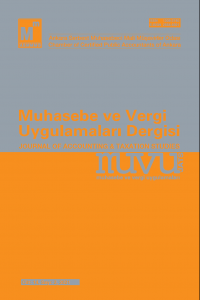Abstract
The article aims to develop a scientific perspective for future studies by reviewing the relevant literature and synthesizing the available literature data within the framework of published studies on risk reporting between 2000 and 2020 years. In this research which content analysis is preferred in data collection was determined that a significant part of the studies examined were carried out after 2010, practiced on non-financial enterprises and covered a single country. In addition, that the majority of the articles and theses, both in papers and theses, are prepared in European countries and generally reveal the degree of relationship between various aspects of the enterprise (size, the structure of board, sector in which they operate) and the level of risk reporting has been concluded.
Abstract
Bu makalede 2000-2020 yılları arasında risk raporlamaya yönelik yayınlanmış araştırmalar çerçevesinde konuyla ilgili literatürün gözden geçirilmesi ve mevcut literatür verilerinin sentezlenmesiyle gelecekte yapılacak çalışmalar için bilimsel perspektifin geliştirilmesi amaçlanmaktadır. Veri toplamada içerik analizinin tercih edildiği bu araştırmada incelenen çalışmaların önemli bir kısmının 2010 yılından sonra yapıldığı, finansal olmayan işletmeler üzerinde gerçekleştirildiği ve tek bir ülkeyi kapsadığı tespit edilmiştir. Ayrıca konuya yönelik gerek bildiri gerekse de tezlerin tamamı ile makalelerin büyük bir çoğunluğunun Avrupa ülkelerinde hazırlandığı ve genellikle işletmeye ait çeşitli özellikler (büyüklük, yönetim kurulunun yapısı, faaliyette bulunulan sektör) ile risk raporlama düzeyi arasındaki ilişki derecesini ortaya koyduğu sonucuna ulaşılmıştır.
Details
| Primary Language | Turkish |
|---|---|
| Subjects | Business Administration |
| Journal Section | Issue |
| Authors | |
| Publication Date | July 1, 2021 |
| Submission Date | September 23, 2020 |
| Acceptance Date | December 24, 2020 |
| Published in Issue | Year 2021 Volume: 14 Issue: 2 |

This Journal Licensed under a Creative Commons Attribution-NonCommercial 4.0 International License.
This license allows reusers to distribute, remix, adapt, and build upon the material in any medium or format for noncommercial purposes only, and only so long as attribution is given to the creator.

